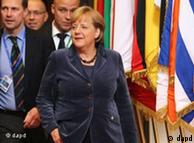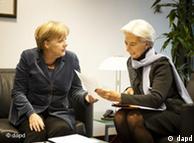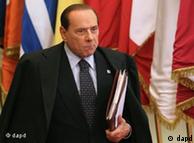EUROPEAN UNION | 27.10.2011
EU leaders agree haircut for Greece after marathon summit
"The world was watching and we showed it that we have come to the right decisions," said German Chancellor Angela Merkel as results of Wednesday night's marathon summit broke just before dawn.
Greece will get its debt cut - but that is not all.
The aim was a complete package to solve the euro debt crisis - a debt cut for Greece, the expansion of the European Financial Stability Fund (EFSF), the basis for all bailout plans, and a strong shot in the arm for banks.
And the message - addressed to financial markets, investors and EU nations themselves - was that Europe will protect its member states threatened as they are by the growing crisis.
French President Nicolas Sarkozy stressed how important the decisions were as he explained that the complex and necessary topics had led to very long negotiations.
"But I believe the results will bring relief to the world, which has waited for tough decisions from the eurozone," Sarkozy said.
 Sarkozy offers 'relief' to the world
Sarkozy offers 'relief' to the worldThat relief was felt on markets soon after the leaders' announcement, with world stocks and the euro rising to their highest levels in nearly two months.
Frankfurt's DAX was up 3.5 percent and France's benchmark CAC 40 index climbed by 4 percent. Asian stocks also rose on the positive news. The euro climbed above $1.40 for the first time since September.
But the road to Thursday's result was rough. As the negotiations dragged on into the early hours of the morning it was the haircut for Greece that proved the biggest problem.
Greek representatives debated hard with bank representatives from the banks' umbrella body, Institute of International Finance (IIF), while next door EU state and government heads sat together, asking themselves whether there should be a debt cut for Greece, how high it should be, and under which conditions.
The banks tried to fight off the prospect of a debt cut and the related losses through the night.
50 percent debt cut for Athens
Raising the pressure on the banks, German Chancellor Angela Merkel, French President Nicolas Sarkozy, EU President Herman van Rompuy and the head of the International Monetary Fund, Christine Lagarde, stepped up to the marathon negotiations. To do it, the actual EU summit was interrupted.
Then, in the early hours of the morning - at around 3:30 a.m. - came the breakthrough.
Finally, the banks agreed to write off 50 percent of Greek debt - roughly 100 billion euros ($140 billion).
It will reduce Greece's overall debt to 120 percent of gross domestic product. It is currently running between 160 and 170 percent.
But the banks' pledge is voluntary, and some analysts say it may not happen at all.
A lever for the EFSF
EU leaders were also able to expand the EFSF. Its power will grow to almost a trillion euros from its current level of 440 billion. But it has yet to be decided how this "lever" will be achieved.
One option for the lever would be to establish a form of partially comprehensive insurance. That would mean that when investors buy government bonds (or loans), the EFSF would cover 20 percent of the risk.
The other option would be to establish one or more funds using EFSF bonds and private contributions. With their help, it would be possible to mobilize more money on the markets.
It is also possible that leaders could pick a mix-and-match option - and this is where China comes in to the equation.
French President Nicolas Sarkozy is due to meet the Chinese President Hu Jintao about a possible contribution to the EFSF lever from Beijing.
Buffer for the banks
All 27 EU member states have agreed to force banks to raise their core capital quotas - also known as Tier 1 Ratings - to nine percent by 2012. They are talking about an extra 106 billion euros in capital.
The core capital quota refers to the balance of a bank's capital against the loans and investments it has made. It is hoped this move would protect banks against possible new crises in larger EU countries.
Italy under pressure
Italy is one of the countries where the crisis could still spread. Prime Minister Silvio Berlusconi has announced a number of reforms, but has done little to make them a reality.
But under pressure from other leaders at the EU summit over the weekend, Berlusconi returned to Brussels on Wednesday with a new promise of reform.
In a letter to the members of the EU summit, Berlusconi pledged to deliver a plan by November 15 to include adjustments in Italy's job market, pension program, and privatization plans.
Berlusconi's outline of a plan also aims to improve conditions for business through less bureaucracy and modern organization.
His plan made a good impression, according to Polish Prime Minister Donald Tusk. But the last few days appear to have left their mark on Berlusconi, who faces ongoing speculation about his departure.
Author: Daphne Grathwohl, Brussels / za
Editor: Nicole Goebel dw
Editor: Nicole Goebel dw




No comments:
Post a Comment